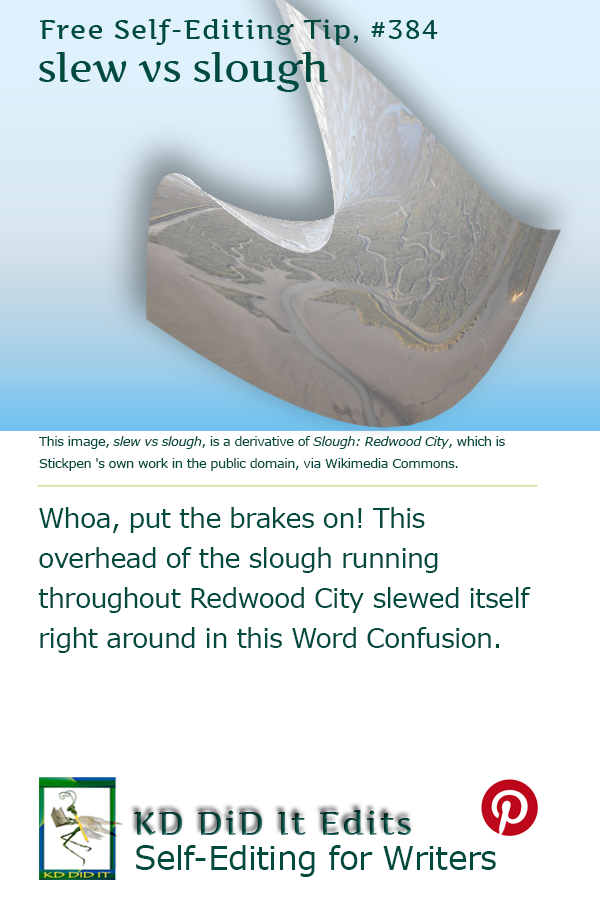I’ve been running into a slew of slews and find myself falling into a slough. Mostly because I’ve learned that slough has some alternative spellings . . . dang it. I wanted to be all self-righteous about writers improperly using slough for slew, and I can’t. I hate that.
I can take heart, though, that slough is the more common choice for swamps and mucky depressions. I know I feel better about sloughing that dead skin off my feet instead of slewing it . . . slew the skin off my face just doesn’t feel right.
Exploring Later . . .
You may want to explore “Anchorage, Haven, Moorage, and Roadstead“, “Arroyo vs Coulee vs Wadi vs Wash“, “Bay vs Bight vs Cove“, “Bayou vs Bog vs Marsh vs Swamp“, “Beach vs Coast vs Shore“, “Born vs Borne vs Bourn“, “Brook vs Burn vs Draw vs Lick“, “Canal vs Impoundment vs Moat vs Reservoir“, “Cay vs Key vs Quay“, “Channel vs Dyke vs Rill“, “Creak versus Creek“, “Dam versus Damn“, “Delta vs Estuary vs Rapids vs Source“, “Dock vs Pier vs Wharf“, “Firth vs Fjord vs Gulf“, “Harbor vs Marina vs Port vs Quay“, “Lakes: Kettle, Loch, Mere, and Oxbow“, “Ocean versus Sea“, “Peer versus Pier“, “River vs Stream vs Tributary“, “Rivulet vs Runnel vs Sike“, “Sea versus See“, and “Straight versus Strait“.
Word Confusions . . .
. . . started as my way of dealing with a professional frustration with properly spelled words that were out of context in manuscripts I was editing as well as books I was reviewing. It evolved into a sharing of information with y’all. I’m hoping you’ll share with us words that have been a bête noire for you from either end.
If you found this post on “Slew versus Slough” interesting, consider subscribing to KD Did It, if you’d like to track this post for future updates.
| Slew | Slough |
|---|---|
 — |
 — |
| Part of Grammar: | |
| Morpheme: slay
Noun 1 and 2 Verb 1, intransitive & transitive 3 Plural for the noun: slews Third person present verb: slews Alternative spelling: slue |
Noun 1 and 2 Verb 2, intransitive & transitive Plural for the noun: sloughs Third person present verb: sloughs Alternative spellings: slew, slue, sluff |
| Noun: A violent or uncontrollable sliding movement 1 [Informal; a slew of] A large number or quantity of something 2 Verb, intransitive:
Verb, transitive: Kill (a person or animal) in a violent way 3
|
Noun: A place of deep mud or mire 1
A situation characterized by lack of progress or activity Something that may be shed or cast off 2 A mass of dead tissue separating from an ulcer A state of moral degradation or spiritual dejection Verb, intransitive:
Crumble slowly and fall away To plod through or as if through mud Verb, transitive:
Engulf in a slough To get rid of or discard as irksome, objectionable, or disadvantageous (usually used with off)
|
| Examples: | |
| Noun: I was assaulted by the thump and slew of the van. He asked me a slew of questions. He had a slew of unpaid bills. Verb, intransitive: “The telescope slewed to the coordinates as soon as it received the alert and within seven minutes of the start of the burst, it began observations” (Slewed). “The violet eyes slewed from door to window as if desperate for escape” (James). Verb, transitive: St. George slew the dragon. A man was slain with a shotgun. You slay me, you really do. |
Noun: Those from Beaver Creek were taken in a slough which has no connection with the main stream during low water. The economic slough of the interwar years have been difficult on many people. The drugs can cause blistering and slough. Verb, intransitive: One hand can ruff while the other hand sloughs a loser. “Smooth fallen branches from which all bark has sloughed.” – David M. Carroll Verb, transitive: Exfoliate once a week to slough off any dry skin. He is concerned to slough off the country’s bad environmental image. |
| Derivatives: | |
| Adjective: slayable, unslayable Noun: slayer, sley, |
Adjective: sloughy |
| Phrasal Verb | |
| slough off | |
| History of the Word: | |
|
The first known use was before the 12th century.
|
C’mon, get it out of your system, bitch, whine, moan . . . which words are your pet peeves? Also, please note that I try to be as accurate as I can, but mistakes happen or I miss something. Email me if you find errors, so I can fix them . . . and we’ll all benefit!
Satisfy your curiosity about other Word Confusions on its homepage or more generally explore the index of self-editing posts. You may also want to explore Book Layout & Formatting Ideas, Formatting Tips, Grammar Explanations, Linguistics, Publishing Tips, the Properly Punctuated, Writing Ideas and Resources, and Working Your Website.
Resources for Slew versus Slough
Some of these links may be affiliate links, and I will earn a small percentage, if you should buy it. It does not affect the price you pay.
Apple Dictionary.com
“Is it Slough or Slew?” Stack Exchange. Mar 2014. Web. n.d. <http://english.stackexchange.com/questions/10317/is-it-slough-or-slew>.
James, P.D. An Unsuitable Job for a Woman. Scribner: 1972 and 2015. <https://amzn.to/3Q8nCB9>.
“Slewed.” Myefe.com. n.d. Web. n.d. <http://myefe.com/transcription-pronunciation/slewed>.
Pinterest Photo Credits:
Slough: Redwood City is Stickpen’s own work which he has placed in the public domain, via Wikimedia Commons. I took some drastic Photoshop liberties with it, slewing it right ’round on itself.
Revised as of 20 Apr 2024
By: Kathy Davie

